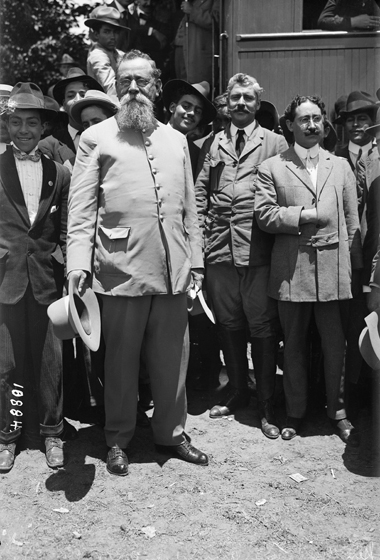A distinct New Zealand variant of the English language has been in existence since at least 1912, when Frank Arthur Swinnerton described it as a "carefully modulated murmur," though its history probably goes back further than that. From the beginning of the British settlement on the islands, a new dialect began to form by adopting Māori words to describe the different flora and fauna of New Zealand, for which English did not have any words of its own.[3]
Audio recordings from the 1940s of very old New Zealanders have captured the speech of those born to the first generation of settlers in New Zealand, which means linguists can hear the actual origin of the accent. For example, a recording of 97-year-old Mrs Hannah Cross, who was born in New Zealand in 1851, and lived there her whole life, shows she had a Scottish accent. Even some second generation New Zealanders did not have a noticable "New Zealand accent", such as Mr Ernie Bissett, who was born in Kaitangata in 1894 and lived in New Zealand his entire life. But people growing up in mining town Arrowtown, where there was a mixture of accents, developed a recognizable New Zealand accent, such as Annie Hamilton, whose parents arrived there in 1862. [2][3] The children growing up exposed to different accents picked up different features of these, but in their children, the second generation, there is a unification towards the ‘foundation accent’.
news in english
Wednesday, January 26, 2011
Dictionaries of New Zealand English
The first comprehensive dictionary dedicated to New Zealand English was probably the Heinemann New Zealand dictionary, published in 1979. Edited by Harry Orsman, it is a comprehensive 1,300-page book, with information relating to the usage and pronunciation of terms that were both widely accepted throughout the English-speaking world and those peculiar to New Zealand. It includes a one-page list of the approximate date of entry into common parlance of many terms found in New Zealand English but not elsewhere, such as "haka" (1827), "Boohai" (1920), and "bach" (1905).
In 1997, Oxford University Press produced the Dictionary of New Zealand English, which it claimed was based on over forty years of research. This research started with Orsman's 1951 thesis and continued with his editing this dictionary. To assist with and maintain this work, the New Zealand Dictionary Centre was founded in 1997. Since then, it has published several more dictionaries of New Zealand English, culminating in the publication of The New Zealand Oxford Dictionary in 2004.
A more light-hearted look at English as spoken in New Zealand, A personal Kiwi-Yankee dictionary, was written by the American-born University of Otago psychology lecturer Louis Leland in 1980. This slim volume lists many of the potentially confusing and/or misleading terms for Americans visiting or emigrating to New Zealand. A second edition was published during the 1990s.
In 1997, Oxford University Press produced the Dictionary of New Zealand English, which it claimed was based on over forty years of research. This research started with Orsman's 1951 thesis and continued with his editing this dictionary. To assist with and maintain this work, the New Zealand Dictionary Centre was founded in 1997. Since then, it has published several more dictionaries of New Zealand English, culminating in the publication of The New Zealand Oxford Dictionary in 2004.
A more light-hearted look at English as spoken in New Zealand, A personal Kiwi-Yankee dictionary, was written by the American-born University of Otago psychology lecturer Louis Leland in 1980. This slim volume lists many of the potentially confusing and/or misleading terms for Americans visiting or emigrating to New Zealand. A second edition was published during the 1990s.
Subscribe to:
Posts (Atom)

